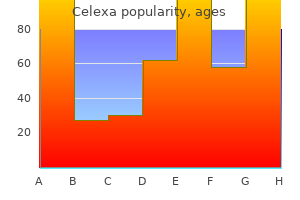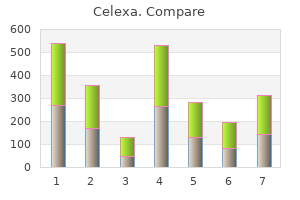"Discount celexa 10 mg free shipping, medications high blood pressure".
By: G. Mirzo, M.B.A., M.D.
Clinical Director, University of South Alabama College of Medicine
Analyzes how these choices influences factors including representation medicine man aurora discount 10 mg celexa visa, accountability symptoms melanoma buy discount celexa on line, party systems medications not to take with grapefruit purchase celexa online pills, corruption treatment zinc deficiency cheap celexa 20 mg with amex, and economic growth. Utilizes public health topics to illustrate the fundamental problems of the politics of regulation and social policy. Explores extent to which emerging digital communication technologies transform the institutions and practice of democratic government in the United States. Topics include the impact of emerging communication technology on campaigning, legislative representation, agency rulemaking, and deliberation, as well as the legal, regulatory, and political context of public sector technology. Familiarizes students with the procedures and techniques, from theory construction to data collection and analysis, needed to design and conduct original research for an honors thesis. Focuses on the social, environmental, and political factors that shape population health. Examines government regulation from a political perspective, covering both traditional areas of business regulation and the newer social regulation in areas of environment, health and safety, and personal behavior. Evaluates rationales for and against regulation, in theory and through case studies. Topics include bibliographic research, fieldwork, statistics, case study analysis, professional writing, and standards of academic scholarship. Independent research and preparation of an honors thesis completed under the supervision of a faculty member. Introduces methods and approaches used to describe, explain, and evaluate public policies. Examples include group theories, system approaches, program planning, and budgeting systems. Examines the political and administrative processes of economic policy formation, the rationale of government programs, and the mixture of facts, values, and social forces that determine policy. Emphasizes issues of government-economy interaction emerging under the impact of modern technology. Examines different forms of violence perpetuated by states, insurgents, military, police, and organized crime. An examination of the structures of the various electoral systems used around the world. Analyzes how these choices influence factors including representation, accountability, party systems, corruption, and economic growth. Topics include decision-making processes, leadership, formal and informal organization, and the interrelationships among values, structures, and behavior patterns. Explores the nature, origins, and purposes of political violence in Latin America. Includes case studies of repression in Argentina, genocide in Guatemala, counter-insurgency in Colombia, and drug-related violence in Mexico, Brazil, and Central America. Student prepares a written proposal endorsed by a supervising instructor, as a means of meeting individual curricular needs. Explores how attorneys devise and make legal arguments, oral presentations, argument skills, 484 and the basics of legal analysis. Offers opportunity of the historical and comparative case study approaches to social science. Direct evaluation of the local political process through participant observation, combining academic instruction and supervised field work. Students will examine firsthand political behavior and the policy process in one location in local political systems. Survey of basic mathematical tools relevant to research in political science and other disciplines of the social sciences, with an emphasis on concepts and applications. Topics include sets, matrix algebra, comparative-static analysis, optimization problems, exponential and logarithmic functions, equality constraints in optimization, and integration. Topics include model specification, measures of goodness of fit, two-stage least squares, and models with binary dependent variables. Students participate in and observe substantive theoretical analyses of political behavior and policy processes. Evaluates theoretical debates relevant to trade politics including economic growth and development, gender, environmental protection, migration, trade in services and intellectual property protection. In the case of a twoor three-quarter sequence, the final grade may be deferred until completion of the last quarter.

However medications best buy for celexa, other more general training strategies medicine keppra buy celexa 10mg otc, such as reflexivity training and team development training medications that cause hyponatremia celexa 20 mg visa, also improve knowledge building and knowledge sharing and medicine 832 celexa 20mg mastercard, in addition, provide guidance in performance episodes. Team Coordination Training Team coordination training is a promising approach to facilitate the complex coordination of tasks required for success in science teams. This training was developed specifically to help teams modify responses based upon changes to their environmental situation. It focuses on helping teams adapt to the environmental demands of high-workload and timestressed settings. This included pre-planning, information transmission, and anticipating information needs (Entin and Serfaty, 1999). It is primarily taught using vignettes to help teams recognize effective and ineffective teamwork. Practice and feedback are then provided in sessions where teams are able to apply what they have been taught and modify applications based upon errors. The goal is to turn explicit interaction factors that are thought to require effort on the part of the team. Although team coordination training was developed to help teams in contexts of high workload and stress, the competencies it develops. Gorman, Cooke, and Amazeen (2010) also explored a form of coordination training using methods described earlier in the cross-training section. The authors examined how to improve adaptability in teams through training that included disruptions to learned team coordination mechanisms. This involved, for instance, disrupting communication channels the team used to coordinate. Gorman, Cooke and Amazeen (2010) argued that this process-oriented training method helped teams deal with variability in coordination demands. The authors suggested that, similar to learning research on variability in practice, this helped teams generalize adaptive processes. By introducing coordination variability to the training, teams learned how to adapt their responses to changes in their environment and improve coordination during performance episodes. Science teams and larger groups face uncertainties that can arise from research findings. Two expert users (an academic medical doctor and a medical librarian) reviewed the website, finding that it followed principles of instructional design for adult education, was easy to navigate, and used attractive audiovisuals to present lessons, along with links to additional information and outside websites (Aranoff and Bartkowiak, 2012). The instrument includes 34 probing statements accompanied by Likert scales to indicate the extent to which a respondent agrees with each statement. The statements are designed to elicit fundamental assumptions about science, including statements about ways of knowing (epistemologies), values, and the nature of the world. At the workshops, participants first complete the instrument and then engage in a facilitated dialogue lasting about two hours. Data obtained from the workshop, including an audio file and pre- and post-dialogue reactions to the statements, are provided to the participants for analysis and reflection. Although both the Toolbox instrument and the workshops are based on extensive theory and research and appear to target knowledge, skills, and attitudes supportive of interdisciplinary communication, to date there has been no empirical evaluation of whether participation in a Toolbox workshop leads to sustained improvement in cross-disciplinary dialogue after the workshop is over. Just over half of those surveyed provided responses, and of these, 85 percent indicated that the workshop increased their awareness of the knowledge, opinions, or scientific approach of teammates, while 77 percent reported that the workshop had made a positive contribution to their professional development. A modified instrument for the health sciences was pilot-tested in two workshops with 15 participants, 10 of whom completed pre- and 5-9 Copyright © National Academy of Sciences. Comparison of pre- and postquestionnaires revealed changes in about 3040 percent of the items, related to motivations, research approaches, methods, confirmation, values, and reductionism, suggesting that the dialogue had met its goal of encouraging participants to thoughtfully consider other points of view. In the 1960s and 1970s, when health sciences faculty experimented with interdisciplinary courses that focused on broad skills, curriculum committees and professional associations responded by mandating minimum levels of disciplinary knowledge and skills (Fiore, 2008). Elementary and secondary school science classes typically ask students to work alone, listening to lectures, reading texts, or taking tests designed to measure recall of facts. There are few opportunities to learn to collaborate effectively or understand science as a social and intellectual process of shared knowledge creation (National Research Council, 2006, 2007). At the doctoral level, some students participate in science teams and groups, but continue to receive little or no guidance or instruction on how to be an effective collaborator. Students develop deep conceptual understanding of topics and methods within a discipline, and are trained in its unique perspectives, languages, and standards of evidence (epistemologies). As a result, they may consciously or unconsciously develop a negative perception of other disciplines (National Academy of Sciences, National Academy of Engineering, and Institute of Medicine, 2005). Although students often work in small groups when engaging in these 5-10 Copyright © National Academy of Sciences.
The results revealed some cultural 48 Chapter 2 Methodology of Cross-Cultural Research differences medicine for yeast infection buy cheap celexa 40mg. For example treatment 3 phases malnourished children cheap 10mg celexa free shipping, the number of recalled dreams reported by non-Hispanic respondents was significantly higher than in all three Hispanic groups treatment keratosis pilaris discount generic celexa canada. Moreover medicine just for cough cheap celexa 10mg with mastercard, both Mexican and Venezuelan participants had greater negative emotions associated with their dreams than Spanish and U. The author explained the difference in the number of reported dreams by suggesting that Hispanic groups are more passive in their coping styles. Moreover, they consider unpleasant dreams a bad omen and, therefore, simply do not want to reveal them as often as non-Hispanics do. However, these differences may be attributed to other features-if one looks carefully at some subtle factors. Even though the subjects of this study were people of the same occupational status, they could be significantly different in terms of their living conditions and sleeping arrangements. Non-Hispanic American and European families typically have fewer children and more individual privacy in their homes and apartments than do families in many other countries. In addition, factors such as recent political developments in the countries studied, sporting events, weather changes, and stock market numbers may affect the way people evaluate their own lives. Cultural differences may be detected in the relative importance assigned to certain events. Each group was given a questionnaire that contained 14 statements: seven characteristics of an individualistic orientation and seven representing a collectivist orientation. The respondents had to suggest their agreement with the statements on a 5-point scale. It is wiser to choose your friends from people with similar social and family backgrounds as yourself. The people at work depend on me, so I should not let them down no matter how badly the organization cheats me. Individualistic statements: If the organization I work for suffered financial difficulties and asked me to accept a substantial drop in pay, then I would look for another job. The results revealed a trend: Indonesian participants were more collectivistic and less individualistic than their counterparts from New Zealand. Please consider that New Zealand is more advanced economically than Indonesia and there is-contrary to Indonesia-a large middle class in New Zealand. In South Korea, on the contrary, the same unemployment level back in 1998 was considered tragic, because for many years people considered a zero level of unemployment as the only acceptable level. As a result, many individuals in the late 1990s were preoccupied with frustrating thoughts and gloomy predictions about the future (Jordan & Sullivan, 1998). The attitudes began to change after 2003 because the economic situation began to improve. You should also anticipate that research participants from collectivist countries might present themselves as more collectivist than they usually are because of the social desirability of collected behavior in the society under examination. In other words, people can reply and act in a certain way, not necessarily because this is their typical behavior, but because they want to impress the researcher and give her a socially desirable answer. Some studies of the mental health in East Asian countries (China, Japan, and Korea, for instance) revealed that people were giving different information when they wrote about their feelings on a piece of paper and when they told about their experiences in the presence of a professional psychologist (Park, 1988). The professor asks these students to fill out questionnaires, assuming that a group of 25 is a representative sample for this particular class. A student union conducts a poll among students by collecting 300 responses from 150 men and 150 women. The interviews took place in the college library where patrons are approached at random and asked to answer a few questions. People typically do not answer what you ask but what they think you mean by asking (Zaller, 1992). Do you think people migrate from place to place because they look for better lives?
Best purchase for celexa. The Love Affair - Rainbow Valley - 45rpm Original Mono Mix! 1968.

Historians symptoms zoloft dose too high buy generic celexa 40mg line, for example treatment variable buy generic celexa pills, are well aware of such spurious sources of information (Browder medications hydroxyzine buy celexa in united states online, 2000) medicine ball abs order 40mg celexa free shipping. The principal advantage of this method is the opportunity to analyze social, gender, and ethnic discourse on some issues in depth: for example, whether a particular fashion product would have any success among a certain ethnic group or whether a psychotherapeutic procedure would be "working" for several cultural groups. Based on the goal of specific research, the group could be either homogeneous or heterogeneous 40 Chapter 2 Methodology of Cross-Cultural Research (ethnically, nationally, professionally, etc. However, the use of focus-group methodology presents a number of problems for cross-cultural psychologists because these groups do not usually represent randomly selected samples. Also, due to the lack of external validity of any particular focus-group outcome, specialists agree that the validity of the focus-group method in general-and in cross-cultural psychology in particular-rests on the repetition of findings across different groups (Kern & Just, 1995). Indeed, an element or aspect of human activity may be examined from many different angles. Imagine that you study the relationship between family climate and mood disorders in various countries and find that there are more than 30 studies available on this subject and they were all published between 1980 and 2009. Is it possible to analyze these data and make a conclusion about the links-or absence of-between the quality of family relationships and incidents of mood disorders in the family members? These studies are difficult to compare because they appear to be extremely diverse. Some of them are based on interviews with a few dozen families, whereas others included hundreds of participants from different countries at different times. A special statistical method allows cross-cultural psychologists to do quantitative analysis of a large collection of scientific results and integrate the findings. In brief, meta-analysis refers to the analysis of analyses-usually called "combined tests"-of a large collection of individual results in an attempt to make sense of a diverse selection of data. One of the attractive features of this method is the reliance on statistical formulas, and an imperative to include a large selection of studies, not only those that appear to be "good" and "interesting. For instance, meta-analysis of rewarding behavior such as praise, encouragement, and so on across cultures (25 studies altogether) has shown that results depend significantly on the samples studied. Results yielded by student samples differed from those collected from samples of employees (Fischer and Smith, 2003). The method attempts to compare studies that deal with variables that are defined differently. For example, if two researchers identify collectivism in their own dissimilar ways, any comparisons of the two would produce invalid and unreliable results. Moreover, many studies use unlike measuring techniques and are often based on results obtained from dissimilar subject pools. And finally, meta-analysis pays attention to largely published studies that represent significant findings. Therefore, nonsignificant findings are either overlooked or ignored and this may add to some bias in the process of sample selection. In such cases, one of the most difficult tasks appears before the investigator: to make sure that the translated version of Chapter 2 Methodology of Cross-Cultural Research 41 the method is as close to the original version as possible. However, even a well-translated version of a test is always different from the original one. At first glance some identical words may have different meanings, such as the words "friend" in English and amigo in Spanish. An English version, however, does not typically specify who this person is: "he" or "she. Some words and phrases, common in the vocabulary of the average person in the United States, may have no equivalents in other languages. As an example, the phrase "sexual harassment" requires additional detailed explanations when it is translated in some other languages. If you have trouble believing that this is possible, ask anyone-a Spanish, Arabic, Urdu, Vietnamese, or Hebrew-speaking person-to translate the phrase "sexual harassment" into their language. Then ask another person from the same country to translate this phrase back to English. You will likely receive anything but "sexual harassment" as a result of this translation.

A survey of music symptoms xanax is prescribed for discount celexa 20mg with mastercard, dance symptoms juvenile diabetes buy celexa online now, theatre treatment ulcer purchase 10mg celexa otc, and ritual in four major geocultural regions of Asia: Central symptoms by dpo discount celexa 20mg, East, South and Southeast. Examines the ways in which theatre, performance, and film engage with and critique the representations of peoples and cultures of the Middle East. Includes films and plays from the region as well as the work of Americans representing the Middle East. Includes playwriting, acting, directing, scenic design, theatre history, and dramatic literature. Open by invitation only Presentation of a significant piece of creative work with faculty supervision. Students are cast in roles and throughout the rehearsal period are taught by the director how to perform their assigned roles in a professional manner. Prerequisite(s):upper- work, 1-12 hours, Prerequisite(s): upper-division standing; consent of instructor. Includes work with directors or designers in one or more areas of professional production such as acting, design, costumes, lighting, and sound. Students meet weekly with an instructor and conduct research linked to their internship. Students should consult with their departmental advisors and with the program staff before enrolling. During the Fall, Winter, and Spring quarters, students enroll in 12 to 16 units comprising internship units, a seminar, and an optional elective course. Addresses topics in Political Science from the perspective of politics in Washington, D. Explores how Congress works, including representation of constituents, congressional elections, internal rules, the role of parties, relations with the executive branch, and policymaking. Endowed Chair and Faculty Director, University Honors; 381 Skye Hall (951) 827-5323; honors@ucr. University Honors challenges students to take an active role in shaping their education through a variety of curricular, co-curricular, extra-curricular, and service-learning opportunities. Students benefit from University Honors staff support, in the areas of academic counseling, professional development, and guidance on applying for internships, fellowships, awards, and graduate or professional school. A study room, student lounge, and printing privileges are available to University Honors students. Examines American presidential leadership, the evolving role of the presidency in American culture. Complements the internship experience of students with internships in the arts by connecting their internship experience to a focused research project. Covers theoretical perspectives and methodological approaches used in determining the environmental sustainability of various public policies. Complements the internship experience of students whose internships relate to the environment by connecting their internship experience to a focused research project. Complements the internship experience of students whose internships related to health care by connecting their internship experience to a focused research project. During the first-year, students take required University Honors courses, participate in University Honors programs and events, and receive guidance from University Honors Counselors. First-year courses expose students to innovative teaching methods, interdisciplinary thinking, and increased depth of course content. One goal of University Honors courses is to expose students to methods of conceptualizing issues and framing questions that promote scholarship, engagement, and student success. Investigates the complex policy community-including governmental, non-governmental, and intergovernmental actors-that engages in forging international policy. Complements the internship experience of students whose internships relate to foreign policy by connecting their internship experience to a focused research project. Introduces the Supreme Court of the United States as a legal, political and cultural institution. Complements the internship experience of students whose internship relates to law and the courts by connecting their internship experience to a focused research project. Requires a substantial research paper or project, the result of guided independent work drawing on the unique aspects of Washington, D. During the second-year, students engage in scholarly experiences that will allow them to interact with faculty members and begin considering topics for their eventual capstone projects.


